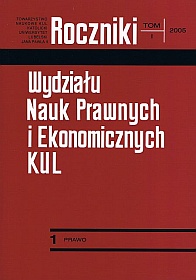Zacieśnianie współpracy Interpolu z innymi organizacjami międzynarodowymi wobec wzrostu zagrożenia terrorystycznego
Abstrakt
Nowadays the international terrorism is the biggest threat for universal safety which concerns the whole international community. Many international law subjects paid the attention to that fact and it induced them to undertake the proper action in order to unite their power in the fight against this threat.
Interpol, as the international police organization, became an initiator of undertaking closer cooperation with other international organizations of both − governmental and non-governmental character. The United Nations Organization is the biggest of them. To them belong also specialized − governmental and non-governmental character. The United Nations Organization is organizations of UN, such as International Atomic Energy Agency – IAEA, International Civil Aviation Organization – ICAO, including its Aviation Security Panel – AVSEC, International Maritime Organization – IMO, World Health Organization – WHO, United Nations Educational, Scientific and Cultural Organization – UNESCO.
Moreover, the close cooperation ties Interpol with such governmental organizations as: Council of Europe, European Police Office – Europol, World Customs Organization – WCO, Organization for Economic Co-operation and Development – OECD, Commonwealth Secretariat, and also Organization of American States – OAS and Organization of African Unity – OAU. That cooperation comes to fruition with numerous anti-terrorist projects which are then realized by every organization within the limits of their statute determined activity profile. There are organized common symposia, consultations or trainings. It is performed between them constant exchange of information, specialized expert's reports and data relating to terrorist criminality.
To the catalogue of above-mentioned governmental organizations it should be added such actively supported the Interpol's operations non-governmental organizations, as: International Society of Criminology, International Association of Penal Law, International Society of Social Defence, International Banking Security Organization, International Air Transport Association – IATA, International Federation of Air Line Pilots' Associations – IFALPA, Airports Council International – ACI, World Tourism Organization – WTO and Office for Prevention of International Terrorism – OPIT. They are equally important link in the international cooperation in the fight against terrorism.
Bibliografia
Ignaczak W.: Współdziałanie z policjami innych krajów: statut i zasady działania Międzynarodowej Organizacji Policji Kryminalnych – Interpol, Szczytno 1999.
ICPO-Interpol Telecommunications Regulations, Vade Mecum, Published by the ICPO-Interpol, General Secretariat, 29.09.1995 r.
Knap M.: Europol – międzynarodowa współpraca policyjna, „Unia Europejska” 2000, nr 2, s. 171.
Kubiak K.: Terroryzm morski. Nowe zagrożenie dla bezpieczeństwa międzynarodowego, „Sprawy Międzynarodowe” 2002, nr 3.
Rakowski P.: Zapobieganie terroryzmowi i jego zwalczanie w dorobku prawnym Unii Europejskiej, „Przegląd Prawa Europejskiego” 7(2000).
Report 7, AGN/67/RAP/7 – Application of article 41 of Constitution, the 67th Session of the ICPO – Interpol General Assembly, Cairo 22nd-27th October 1998.
Rules govering access by an intergovernmental organization to the Interpol telecommunications network and databases, Report 4, AG-2001-RAP-04, Appendix 1, the 70th – Session of the ICPO-Interpol General Assembly, Budapest 24th-28th September 2001.
Symposium on International Terrorism, Lyon, 17-18 October 2000.
Symposium on International Terrorism, Colombo, Sri Lanka, 28th-30th September 1999.
Węgrzyn J.: Ewolucja pozycji prawnej Interpolu w stosunkach z ONZ, „Przegląd Policyjny” 57-58(2000), z. 1-2.
Copyright (c) 2005 Roczniki Wydziału Nauk Prawnych i Ekonomicznych KUL

Utwór dostępny jest na licencji Creative Commons Uznanie autorstwa – Użycie niekomercyjne – Bez utworów zależnych 4.0 Międzynarodowe.

